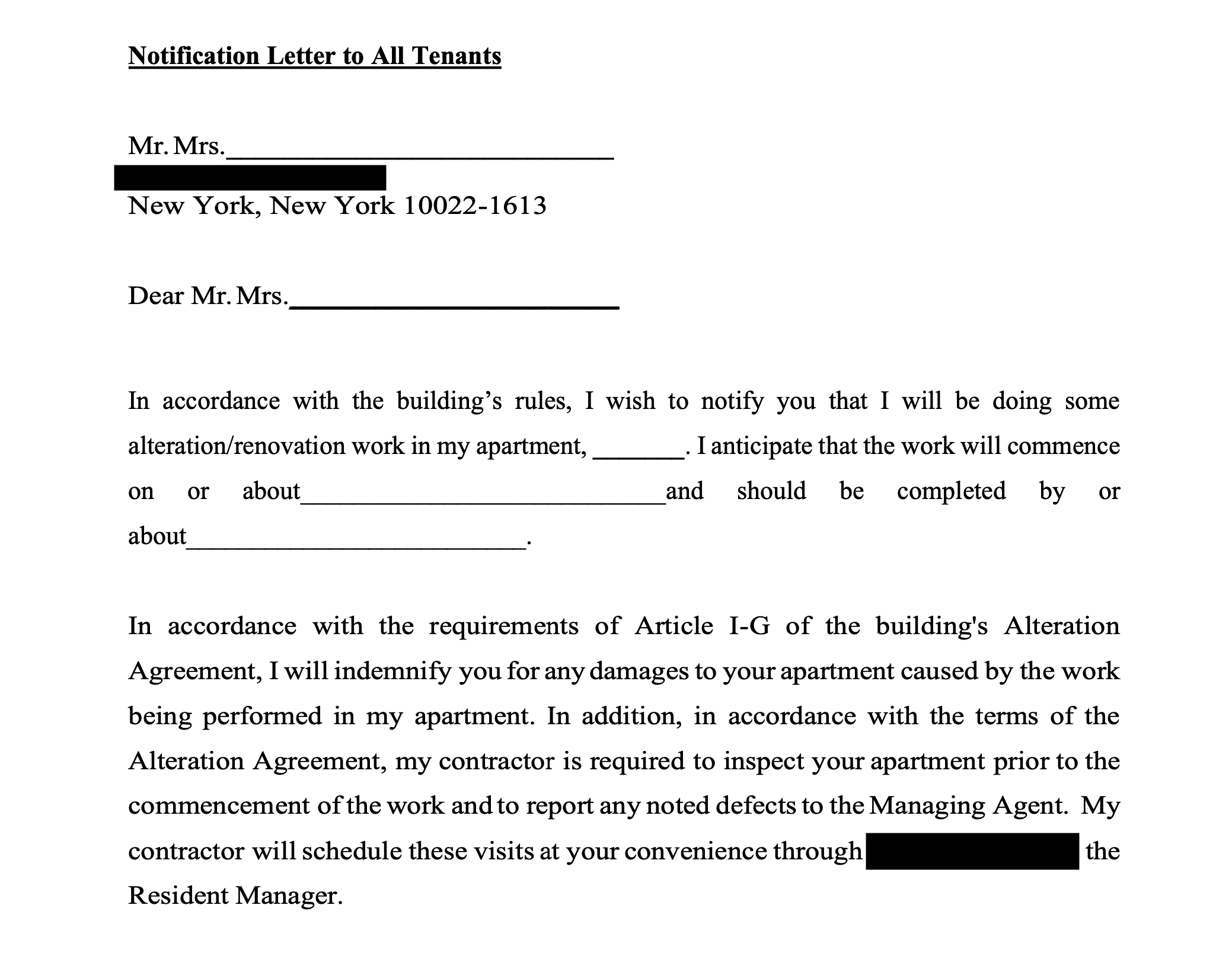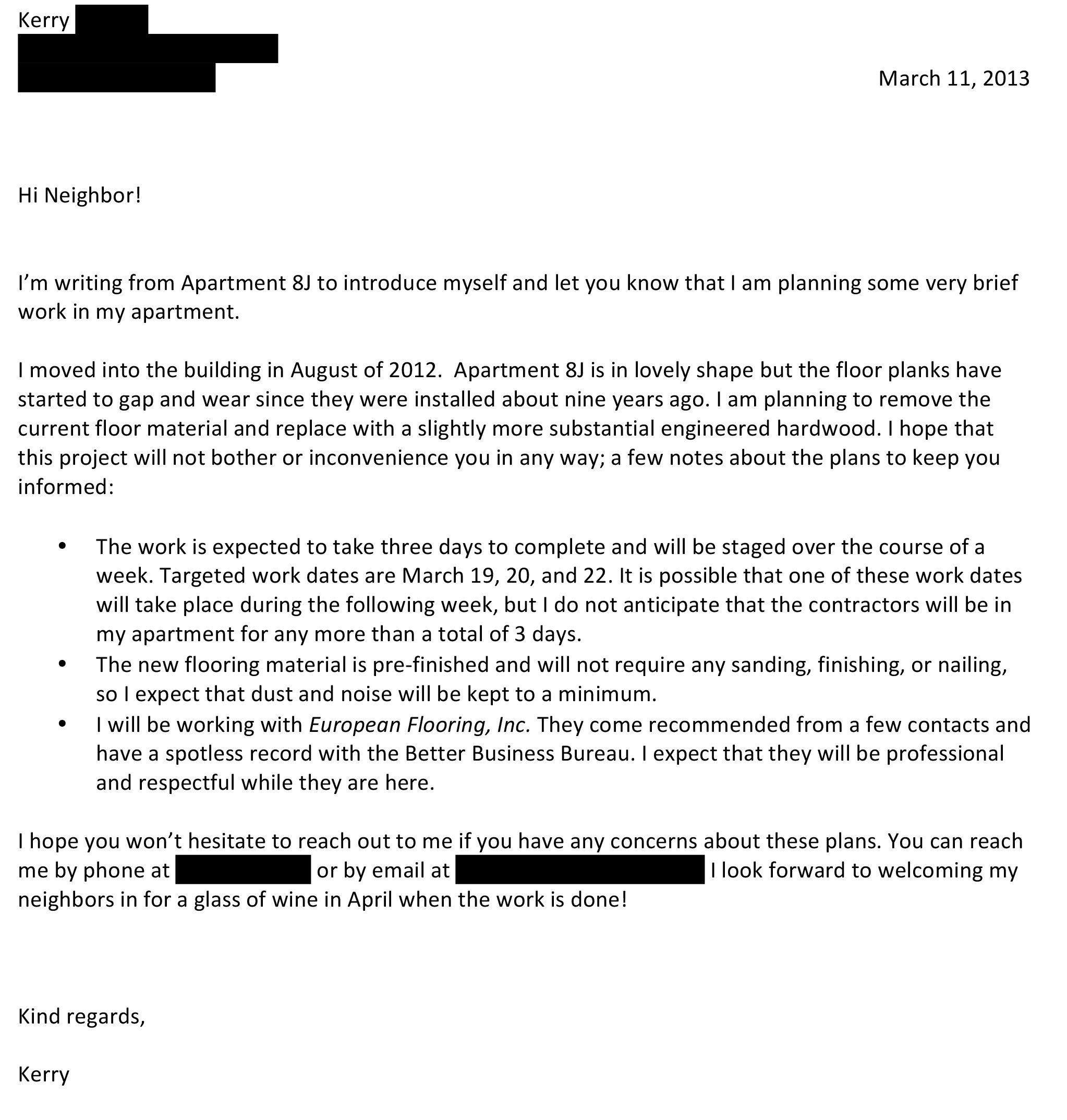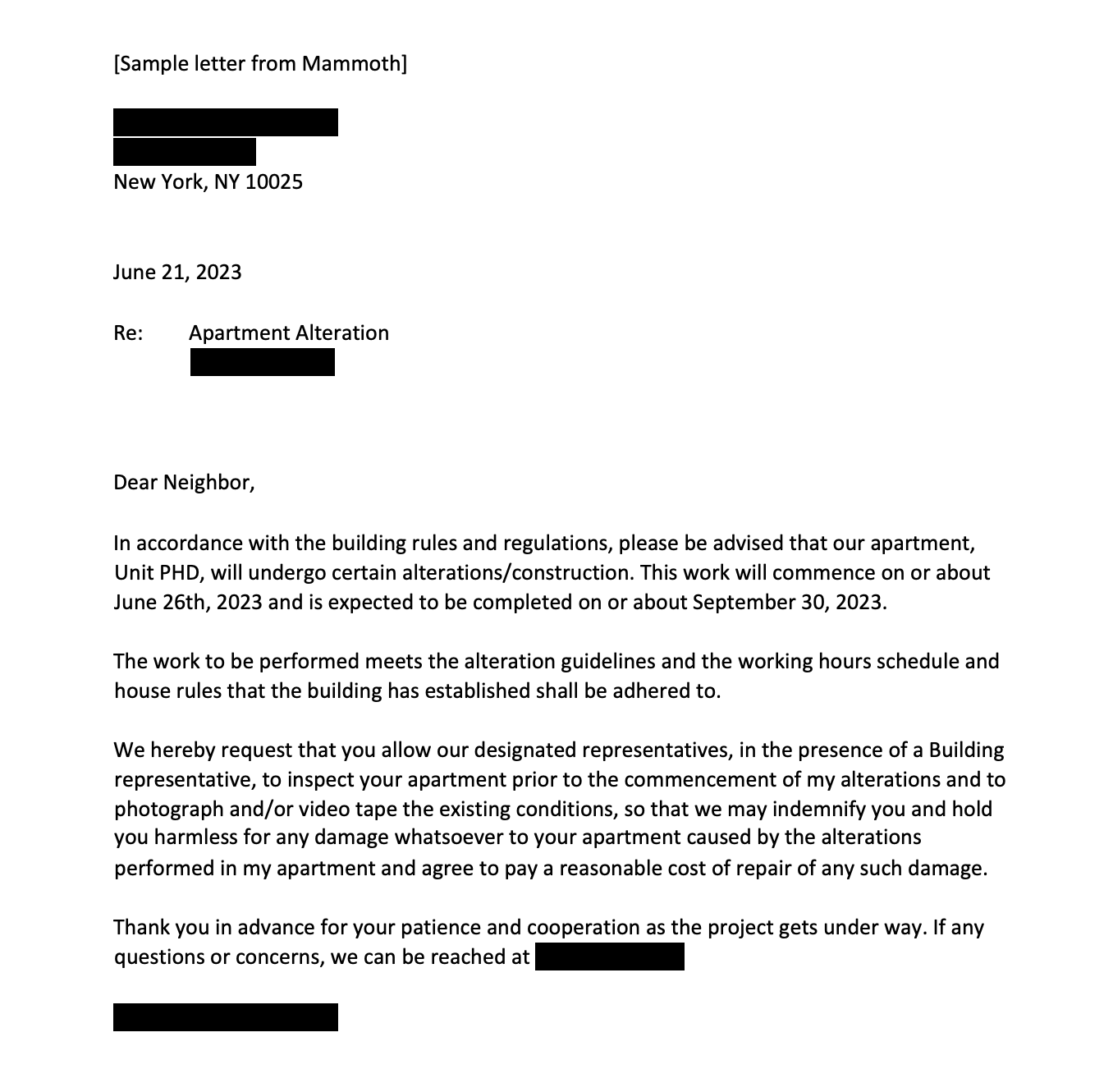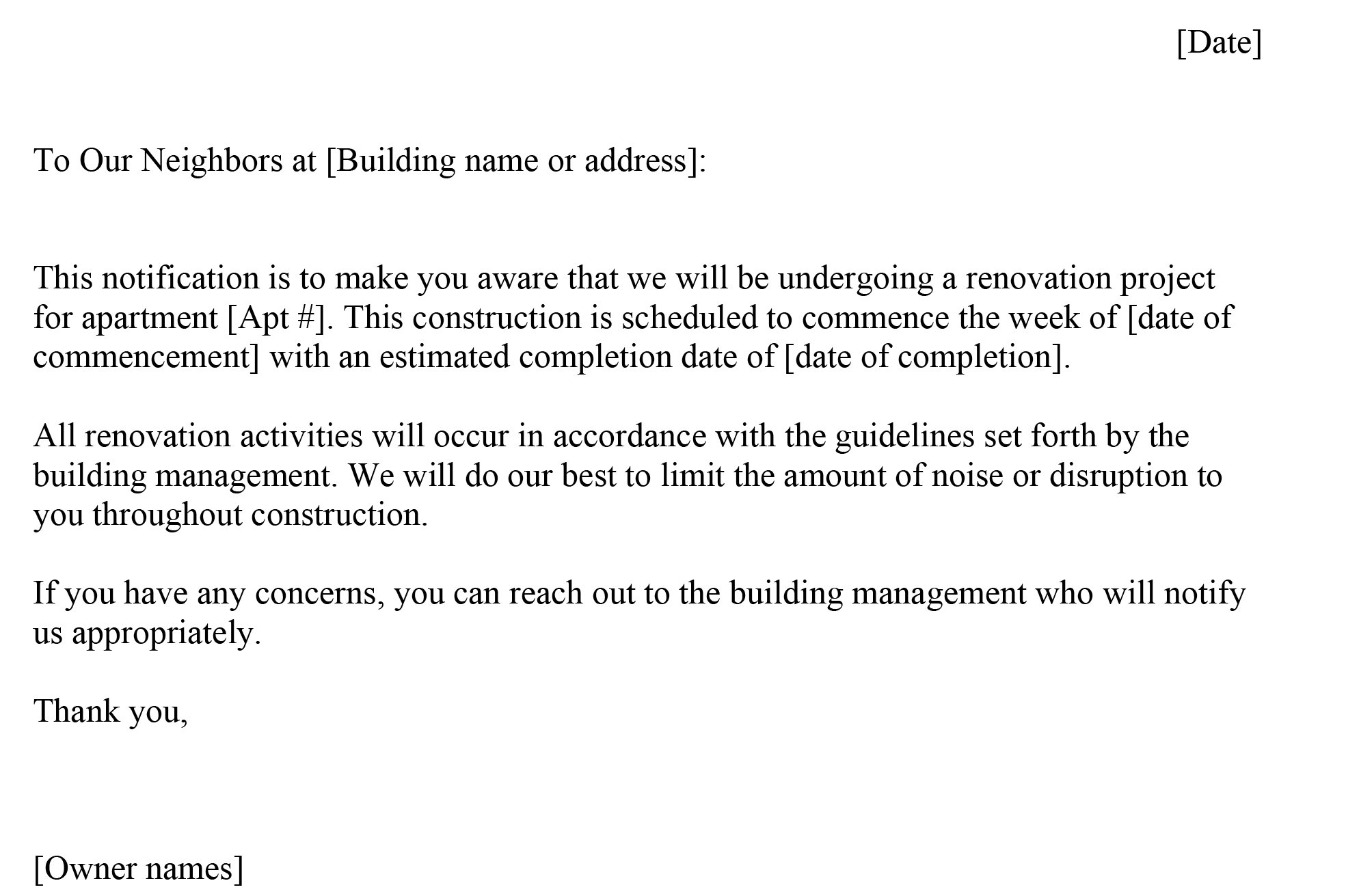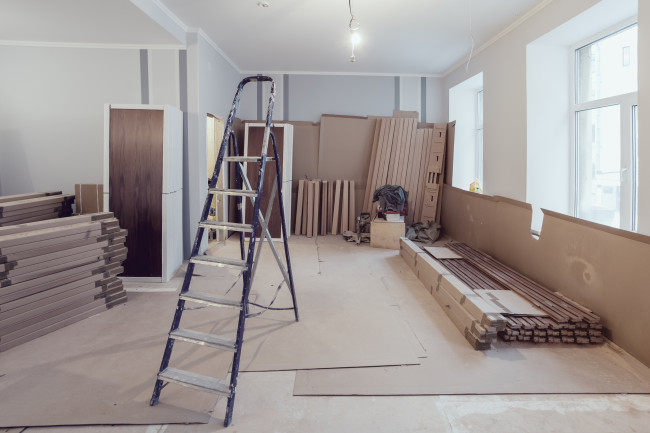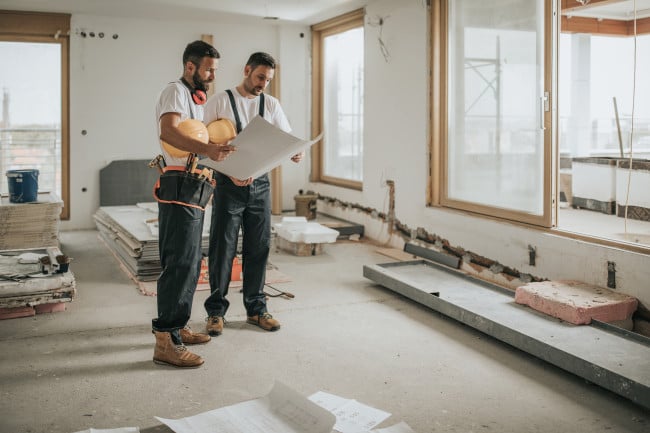Renovating your co-op or condo? Here's how to write a courtesy letter to your neighbors
- Many alteration agreements require you to send a courtesy letter to your neighbors
- Even if not, design pros recommend writing one—and some have a sample letter
- When writing your own, keep it brief, include contact info, and hand-deliver if possible
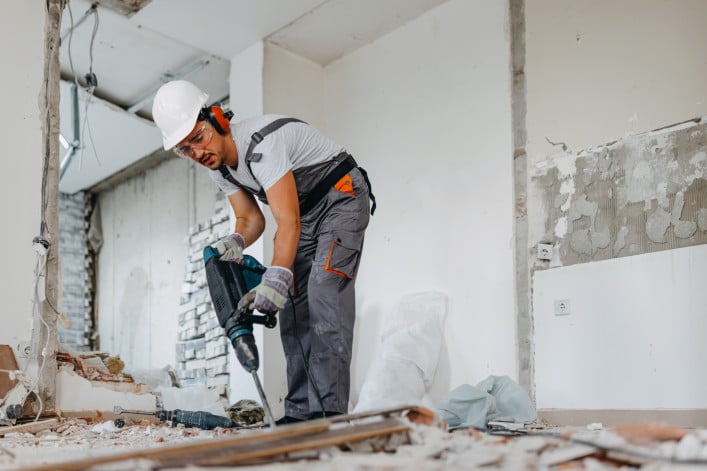
No one likes surprises: Warn your neighbors ahead of time so they can plan accordingly.
iStock
One of many nuances of renovating a New York City co-op or condo is the ripple effect. Even if your project is confined to your own four walls, your neighbors can’t help but get involved—whether they’re suffering the demolition noise or passing your contractors in the hallway.
For that reason, many design professionals recommend notifying your neighbors—upstairs, downstairs, and next door—in writing well in advance of starting any work, and have a standard letter they pass on to clients. It’s a bit like giving adjacent residents a heads-up before throwing a big party, a way to deflect bad feelings and noise complaints. As the work is underway, it helps to periodically warn them before bigger work starts, too.
"These letters are always a good idea for a whole host of reasons, including that many boards require them under the alteration agreement," says Asher Lipman, president of NYCRenovation Coach, adding that a lot of buildings have a form letter that you simply sign.
Vickey Barron, a broker at Compass, says not all boards require them but more are adopting the practice. The condo building she lives in requires notice to be sent to the units above, below, and adjacent to the apartment under construction. (See samples below.) "Even if it's not in the by-laws, it's common courtesy to let your neighbors know of your project and its timeline," she says.
They're called "good neighbor letters" for a reason: As a fellow stakeholder/owner, you are giving others the information they need to prepare accordingly so they know to expect longer elevator wait times, noise that might impact their daily routine, or services being turned on or off—for example, water, heat, or electricity.
The tone of your letter will depend on the relationship you have (if any) with your neighbors: some are perfunctory, others are warmer. If there's a big problem that needs fixing, go ahead and say what it is—most owners will understand and empathize.
What to include in the letter
Everyone Brick spoke to says to keep the missive brief. This is not a time to over-explain, as renovations are notoriously subject to detours and delays. That said, be sure to include the following:
- The projected start and end dates of the job (allowing for some wiggle room)
- A brief description of the work being done (i.e, kitchen expansion, bathroom addition, floor replacement)
- Assurances that the contractor has been instructed to keep hallways clean, avoid work in the evenings and on weekends, and generally minimize disruption
- An apology for any potential inconvenience and a thank you for the neighbor’s patience
- Contact information in case of any concerns—either your own phone number and/or email address or that of the architect/project supervisor or property manager
- Notice of any environmental concerns, such as dust and fumes, that may come up so that sensitive neighbors can take steps to avoid them.
When you might want to ask for a walk-through
For larger jobs like moving walls or substantial flooring work or plumbing, you may want to ask permission to photograph the neighbor’s apartment so that if any damage—or claims of damage—come up, there’s a record of what the place looked like beforehand. The language could be along the lines of: ‘We would like to have our architect take some photos of your apartment to document the condition before any work is done. If you are amenable, we will have someone from the firm call you to set up a convenient time.”
Maryana Grinshpun, founder of NYC-based design-build firm Mammoth (a Brick sponsor), says her firm does this as a matter of course when writing courtesy letters for their clients (as in the sample below).
Note that Barron's building also provides language in its by-laws requesting permission for its architect or consulting engineer to inspect the apartment "to determine if they might be susceptible to damage from the proposed alterations." Here's the template provided in the alteration agreement:
Alteration Letter to Shareholders
Dear___________,
As required by the alteration agreement between the undersigned and the managing agent of the building, please be advised as follows:
- Alterations will be performed in Apartment ___________ commencing on or about ___________ for a period not exceeding ___________ days.
- I agree to indemnify you for any damage to your apartment caused by alterations in my apartment. I agree to pay the reasonable cost of repairing any such damage. At your option, the repairs can be done by my contractors or contractors of your choice.
- If the managing agent of the building considers it desirable to do so, I request that you permit the building’s architect or consulting engineer to visit your apartment to inspect the walls, floors, and ceilings in order to determine if they might be susceptible to damage from the proposed alterations. A building representative will contact you in advance to arrange an appointment for any inspection.
Sincerely,
___________
"The last thing you want is for the downstairs neighbor to say, 'You cracked my ceiling and you guys have to deal with it.' This protects both parties—the neighbor below may have never looked at their ceiling and then blame a crack that was already there on your renovation."
He says fewer buildings are mandating this walk-through, "which I find surprising because i it is equally important." Still, it's worth being proactive to prevent any "he said, she said" situation down the road.
What if the neighbor refuses? Lipman says it happens, in which case he follows up with a letter stating (along the lines of) "we asked to come in but you didn't let us, so if there is any damage in your apartment, it will be hard to determine who is responsible and you are on your own."
In one case, the neighbor finally agreed to let the super walk through the unit without taking any photos. "But there's usually a reason someone doesn't want you seeing their apartment."
It even happens when you are renovating a single-family residence. Barron sold a two-story property to clients who then added two more floors to the existing structure. She says the adjacent neighbor reported that there were cracks in his apartment due to the renovation. "An investigation showed that they were pre-existing cracks, and the claim was dismissed." Lesson learned.
How to communicate with neighbors during the renovation
First of all, get off to a good first impression. "When possible, if the homeowner hand-delivers the letter as opposed to us sliding it under the door, it creates a different vibe," Grinshpun says. "This way you can introduce yourself and chat for a bit." (As one person who suffered through a six-month renovation told Brick, her neighbor "could have introduced herself, ideally in person, long before the required deadline.")
If the project is a lengthy one, Lipman says to send a bottle of wine or some cookies as an extra good-faith measure.
He also sends a separate letter to his clients' neighbors asking if there is anything going on that they should be aware of. "One neighbor told us he was just coming home from the hospital and recuperating; in another case, a mom said her kids were going to be taking exams (it was during Covid) and asked that we try and avoid excessive noise on two specific days. So to the extent we could work around their needs, we did. And that goes a long way with people."
Of course, you could be opening up a gargantuan Pandora's box by asking this question—especially if you are not in a position to do anything with the received information. But if you already have a relationship with a neighbor, you may want to try this approach, with a disclaimer that you'll do what you can but no guarantees.
One thing you can do is provide timely updates ahead of any particularly disruptive stages. "For example, if you're going to have noisy demo work in the beginning and then kind of a lull, or if they'll be doing tile work that involves wet-saw cutting for two days, you could let them know when that is happening," Lipman says.
And when the work is all said and done, you might want to invite your neighbors to see the finished product—a simple gesture of gratitude that can help smooth out any hard feelings.
In the meantime, consider tweaking the sample letters below to use in your own peacekeeping mission.
—Earlier versions of this article contained reporting and writing by Leigh Camping-Karder
